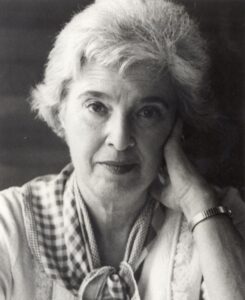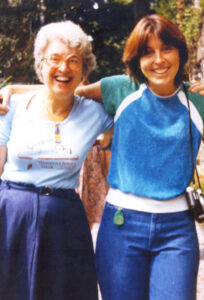Gerda Lerner: My Inspiration
“Women’s History is women’s right. It is an essential, indispensable heritage from which we can draw pride comfort, courage, and long range vision.” Gerda Lerner
by Molly Murphy MacGregor, Co-founder and Executive Director
 On Sunday, April 28, 2013, I attended Gerda Lerner’s Memorial Service, which was held on the campus of the University of Wisconsin at Madison. I wanted to attend the service not only to honor Gerda’s memory, but to hear stories about Gerda from her family, friends, colleagues, and students. As I listened to the tributes to this amazing woman, I wondered what more could be said. She was brilliant, complicated, demanding (sometimes difficult), and extraordinarily talented. She was a Nazi survivor, wife, mother, friend, community organizer, political activist, writer, scholar, educator, mentor, historian, poet, and nature lover. During the service, we learned that Gerda also defined herself as a refugee. When at the end of the service, those who had not spoken were asked if we would like to tell our own Gerda story, I couldn’t speak. Gerda, for me, represented ‘The Road Taken’ and I didn’t have words for that story.
On Sunday, April 28, 2013, I attended Gerda Lerner’s Memorial Service, which was held on the campus of the University of Wisconsin at Madison. I wanted to attend the service not only to honor Gerda’s memory, but to hear stories about Gerda from her family, friends, colleagues, and students. As I listened to the tributes to this amazing woman, I wondered what more could be said. She was brilliant, complicated, demanding (sometimes difficult), and extraordinarily talented. She was a Nazi survivor, wife, mother, friend, community organizer, political activist, writer, scholar, educator, mentor, historian, poet, and nature lover. During the service, we learned that Gerda also defined herself as a refugee. When at the end of the service, those who had not spoken were asked if we would like to tell our own Gerda story, I couldn’t speak. Gerda, for me, represented ‘The Road Taken’ and I didn’t have words for that story.
My connection with Gerda began when I was in my 20s. I had disappointed myself and was desperately searching for a sustaining compass that would provide me with a tangible purpose. My search led me first to the study of American History and then to Women’s History. Gerda’s writings provided the essential perspective I needed in order to consciously self-determine my own life. From Black Women in White America to The Creation of Feminist Consciousness, as well as the books in-between and all those that followed, her extraordinary research and talent gave me my sustaining compass.
 In 1979, I was selected to attend the 19-day Women’s History Institute for Women Leaders, held at Sara Lawrence College, in Bronxville, New York, and chaired by Gerda Lerner. The 39 participants included the Presidents of many women’s organizations including the Girls Scouts of America, NOW, and Women’s Action Alliance, as well as noted scholars and women who had served with Bella Abzug in organizing the National Women’s Conference held in Houston in 1977. My invitation was issued because I had written a plea to the organizing committee to consider introducing the idea of a National Women’s History Week. Along with my plea, I had sent copies of the materials we had produced for the celebrations of Women’s History Week in Sonoma County in 1978 and 1979.
In 1979, I was selected to attend the 19-day Women’s History Institute for Women Leaders, held at Sara Lawrence College, in Bronxville, New York, and chaired by Gerda Lerner. The 39 participants included the Presidents of many women’s organizations including the Girls Scouts of America, NOW, and Women’s Action Alliance, as well as noted scholars and women who had served with Bella Abzug in organizing the National Women’s Conference held in Houston in 1977. My invitation was issued because I had written a plea to the organizing committee to consider introducing the idea of a National Women’s History Week. Along with my plea, I had sent copies of the materials we had produced for the celebrations of Women’s History Week in Sonoma County in 1978 and 1979.
To determine a time to make my pitch to the conference participants, I needed to meet with Gerda. As I write this, I remember my quivering knees and pounding heart. At that moment in time, I could not have imagined our future relationship. It was inconceivable to me that she would become my personal champion as well the essential champion for the establishment of what has become National Women’s History Month and the National Women’s History Alliance.
In the decades that followed our first meeting, Gerda lent her enormous prestige as a scholar and historian to support the credibility of the work of the National Women’s History Alliance.
In the decades that followed our first meeting, Gerda lent her enormous prestige as a scholar and historian to support the credibility of the work of the National Women’s History Alliance. During that time, I had the opportunity to keynote two luncheons attended by Gerda. Each time, knowing that Gerda was in the audience, I was reminded of my quivering knees and pounding heart from our first meeting. And each time Gerda took the opportunity to tell all the scholars in the room the debt they owed to the organizing work of the National Women’s History Alliance. Her unrelenting support has always been and continues to be vital in reminding us of our purpose and possibility.
On May 7, 2013, just weeks after her memorial service, I received an email from Merrill Lynch notifying me that the National Women’s History Alliance was one of the beneficiaries of the Gerda Lerner Charitable Trust. This wonderful gift enabled us to pay off our debt and invest in a new future for the National Women’s History Alliance. Gerda would so appreciate how ‘liberating’ her gift was for us. Her generosity helps us continue the legacy of her life.
Gerda Lerner was one of our 2002 Women’s History Honorees.
Gerda Lerner (April 30, 1920 – January 2, 2013)
Historian
Lerner was the foremost historian in defining the scope and importance of women’s history. The Grimké Sisters from South Carolina (1967) was the first of her ten authoritative books on women’s history topics. Lerner was insistent that theory and practice, consciousness and action, must dynamically inform each other. At the pinnacle of her career, Lerner’s two-volume Women and History (The Creation of Patriarchy in 1986 and The Creation of Feminist Consciousness: From the Middle Ages to Eighteen-Seventy in 1993) mapped the origins and persistence of patriarchy and the resistance to it that we now call feminism.
